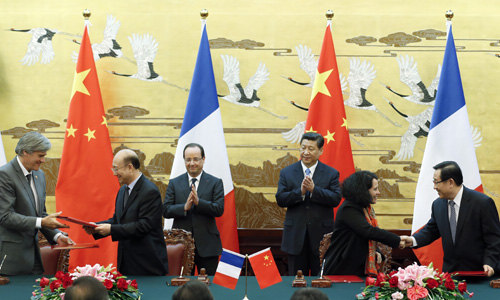|
 |
|
FRUITFUL VISIT: Chinese President Xi Jinping and visiting French President Francois Hollande attend an agreement-signing ceremony involving nuclear power, environmental protection, tourism and other sectors in Beijing on April 25 (CNSPHOTO) |
French President Francois Hollande's short visit to China in late April is bound to exert a long-lasting influence on bilateral relations.
By issuing a joint communiqué and signing a range of agreements, the two sides worked to promote their cooperation in political, economic and cultural aspects. Analysts believe mutual needs are the foundation upon which shared benefits are built.
Strategic significance
During a meeting with Chinese President Xi Jinping on April 25, Hollande said that France is willing to use the opportunity of the 50th anniversary of diplomatic ties in 2014 to map out future cooperation between the two countries.
Xi replied by noting that China and France should continue to prioritize their strategic partnership, work to support each other and expand cooperation in a bid to forge win-win cooperation between the two countries with different political systems, cultures and traditions. He added that the two sides should strengthen coordination when dealing with world affairs, saying, "We are looking forward to seeing the development of a new type of China-France comprehensive and strategic partnership in the future."
To promote the partnership to a higher level, the two leaders agreed to continue annual meetings between the heads of state, enhance strategic communication, and establish a high-level economic and financial dialogue mechanism.
Hollande, who was elected in 2012, is the first leader of a major Western power to visit Beijing since China's new leadership took office in March. His visit served as a link between the past and the future, holding strategic significance for bilateral relations in the coming years.
The two sides share a solid tradition of friendship and partnership. France was the first Western country to establish diplomatic ties with the People's Republic of China in 1964, and Paris has long considered relations with Beijing as a priority of its diplomatic policy.
Zhang Jian, a researcher on European studies with the China Institutes of Contemporary International Relations, said the China-France relationship—both politically and strategically—has always had a special place among relations between China and European countries. France was the first European country to build a new type of comprehensive strategic partnership with China.
Chinese observers believed that the primary goal of Hollande's visit to China was to enhance mutual political trust and build friendship between the new leaders of the two countries. The French president has shown his determination to boost bilateral relations. When China's new leadership took office in March, Hollande immediately had a phone conversation with Xi and congratulated him on his election as Chinese president. Additionally, Hollande appointed as his diplomatic advisor Paul Jean-Ortiz, a career diplomat with extensive knowledge of China who headed the French Foreign Ministry's Directorate for Asia and Oceania and speaks Mandarin.
Qu Xing, President of the China Institute of International Studies (CIIS), pointed out that the China-France relationship has been developing steadily since Hollande assumed the presidency. The French president's recent visit will set the tone for future bilateral relations, he said.
Hollande will theoretically be qualified to run for reelection. Thus, Hollande will play a crucial role in France's China policy for the next four to nine years. If bilateral relations go smoothly for two presidential terms, China-France relations will continue down the track that the two presidents have set, said Qu. He added that Hollande's visit had the special purpose of helping the two sides develop a new type of comprehensive strategic partnership.
The two sides' political cooperation goes beyond the bilateral range. "They have a lot of common stances on pushing forward a multi-polar world and building a fairer and more just international political and economic order," Zhang said. China and France, both permanent members of the UN Security Council, can better safeguard world peace and stability and promote mankind's progress and prosperity by strengthening coordination and cooperation. By combining their efforts, they also can promote progress in addressing global issues of common concern like climate change, food and energy security and international financial reform.
In their joint communiqué, the two countries called for early reform of the international financial and monetary system, saying that the 2010 quota and governance reform of the International Monetary Fund should be implemented as soon as possible.
| 